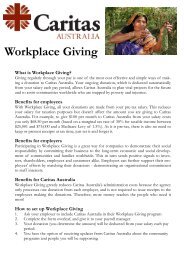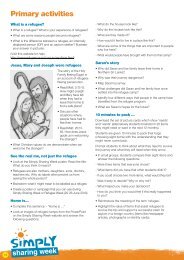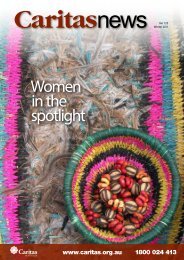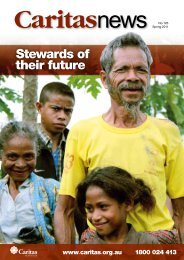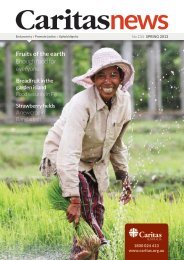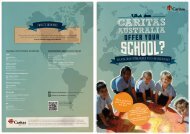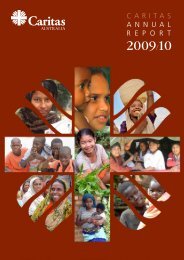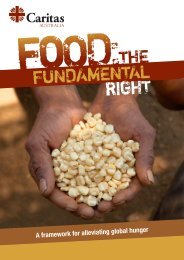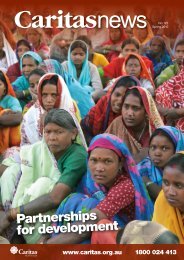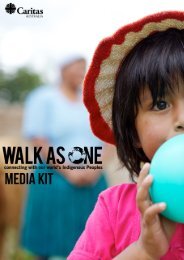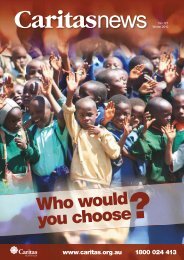if you want peace, work for justice - Caritas Australia
if you want peace, work for justice - Caritas Australia
if you want peace, work for justice - Caritas Australia
- No tags were found...
Create successful ePaper yourself
Turn your PDF publications into a flip-book with our unique Google optimized e-Paper software.
Khin: Thai-Burma borderThe obligation to earn one , s bread... presumes the right to do so. A society in which thisright is systematically denied... cannot be just<strong>if</strong> ied..., nor can that society attain social <strong>peace</strong>.Pope John Paul II, The Hundredth Year (Centesimus Annus),1991, 43Exiled from BurmaKhin is 10 years old. She sharesa rented room in Ranongprovince, Thailand, with hermother and <strong>you</strong>nger brother.Her father lives away, <strong>work</strong>ingas a cook. “We came here fromBurma ten years ago,” Khin’smother explains. “It was gettingharder to survive.” An estimated twoSri Lankamillion people have fl ed to Thailand toescape poverty, violence and instability in Burma.<strong>Caritas</strong> <strong>Australia</strong>’s partner<strong>Caritas</strong> <strong>Australia</strong> supports several programsalong the Thai-Burma border, including aJesuit Refugee Services (JRS) project focusedon the children of migrant <strong>work</strong>ers in Ranong.These children cannot go to Thai schoolsdue to language d<strong>if</strong>ferences, fees and lack ofdocumentation. JRS’ community-based learningcentres offer them primary education and abridge into Thailand’s school system.Supported learningKhin is in grade four at Ban Klang learning centre,one of six JRS schools <strong>for</strong> 5-14 year olds. <strong>Caritas</strong><strong>Australia</strong> supports JRS in renovating buildingsand providing books and tables. Each studentalso receives a un<strong>if</strong>orm, textbooks, stationery,and milk and lunch each day. The Burmesecommunity supports the teachers by offering g<strong>if</strong>tsin kind and volunteering where possible.“I like to read in school.I like everything aboutthe school.”NepalBangladeshIndiaBurma/MyanmarLaosAlthough she is the smallest student in herEnglish course, Khin listens and speaksconfi dently in class. She rarely loses the smile onher face: “I like English the best, because Englishcan be used everywhere.” Khin’s parents did notattend school themselves but are supportive ofJRS learning centresRanongThailandChinatheir children’s education.Khin’s mother explains: “I<strong>want</strong> them to be educatedbecause it’s so d<strong>if</strong>fi cult tofi nd <strong>work</strong>.”High cost of livingL<strong>if</strong>e <strong>for</strong> Burma’s refugeesand migrants can be a dailystruggle to make ends meet.As Khin’s mother recalls: “Whenwe fi rst came to Thailand, we <strong>want</strong>edto save money to go back to Burma and build ahouse. But just having enough money to live dayto day here is d<strong>if</strong>fi cult. I <strong>work</strong> every day from 5amsometimes until 10pm.”Many of Khin’s friends’ parents also <strong>work</strong> longhours in the in<strong>for</strong>mal job market. Khin knowssome students who have dropped out of school“because some of their parents have no moneyand they <strong>want</strong> to <strong>work</strong> to help their parents”. ButKhin and her parents are determined she willfi nish school. “My children have no papers <strong>for</strong>Thailand, no birth registration. I <strong>want</strong> them tolearn Burmese, Thai and English. That’s a veryimportant skill,” Khin’s mother explains.CambodiaVietnamMalaysiaSingaporeIndonesia“In Thailand theBurmese have to <strong>work</strong>very hard.”More than one thousand children have nowattended the learning centres. The long-termgoal is to turn them into transition facilitiespreparing children to enter Thai schools. Lastyear 176 students, with JRS scholarships, beganstudying in Thai schools. It is hoped many morewill do the same.Effective supportWith <strong>you</strong>r support of <strong>Caritas</strong> <strong>Australia</strong>, JRSadvocates <strong>for</strong> Burmese children’s right toeducation, <strong>work</strong>ing with principals and teachers,local authorities and parents. They also visithomes to provide in<strong>for</strong>mation on <strong>work</strong> permitsand healthcare services. Last year, less than fi vepercent of children dropped out of the schools –a remarkable achievement.AmbitionsKhin has great ambitions. “I <strong>want</strong> to be a teacherwhen I grow up... Please open more schools likethis one. This is very good <strong>for</strong> poor families whocannot af<strong>for</strong>d to send their kids to Thai schools.”Your donation to <strong>Caritas</strong> <strong>Australia</strong>’s ProjectCompassion supports long term partnerships<strong>for</strong> <strong>justice</strong> and trans<strong>for</strong>mation in more than35 countries around the world.khinActivities(RE, HSIE/SOSE, PDHPE, English)Look at the Photo gallery:Thai-Burma border PowerPoint onthe DVD/website.How is the JRS project helping Khinand her family to have opportunitiesthey otherwise would not have had?To enter the <strong>for</strong>mal job sector inThailand, Burmese refugees need<strong>work</strong> permits. Imagine that <strong>you</strong> areadults with <strong>you</strong>ng children. Youhave just been told that <strong>you</strong> are notallowed to <strong>work</strong> as <strong>you</strong> are refugees(not Thai citizens) and will not begranted a <strong>work</strong> permit. Write <strong>you</strong>rdiary entries <strong>for</strong> a day, <strong>for</strong> a monthand then a year later. Will it be a<strong>peace</strong>ful future? Why/why not?Do <strong>you</strong> agree with Pope John Paulll (see above) that there cannot be<strong>peace</strong> without a right to <strong>work</strong>?Khin’s education is helping herrealise her goal of becoming ateacher; but education is not just<strong>for</strong> employability.For discussion: How does goodeducation build <strong>peace</strong>?For additional activities, seepage 8 and www.caritas.org.au/projectcompassionPhotos: Molly Mullen<strong>if</strong> <strong>you</strong> <strong>want</strong><strong>peace</strong>, <strong>work</strong> <strong>for</strong><strong>justice</strong>POPE PAUL VI3
Judy: PeruIf we have no <strong>peace</strong>, it is because we have <strong>for</strong>gotten thatwe belong to each other.”Mother Teresa6L<strong>if</strong>e in Cerro CandelaJudy, 39, lives with her husbandand eight children in CerroCandela, a shanty town onthe outskirts of Lima, Peru.Unemployment is high.There is no running wateror sewerage system and nopaved roads. Judy says: “It’s avery polluted environment… weget frequent sicknesses, infectionsEcuadorPeruCerro Candelaand skin complaints.” Yet there is verylimited access to quality health care and socialservices. Judy explains that poverty can cause alot of stress, and violence is common.“It’s a very ‘macho’society with high levelsof domestic violence.Some kids end up ingangs.”<strong>Caritas</strong> partner, MFHSIn 2004, <strong>Caritas</strong> <strong>Australia</strong> began supportingMercy Family Health Service’s (MFHS) Maternaland Infant Health Program. Guided by the beliefthat health is a right, not a privilege, this meetingof basic human needs contributes to a spirit of<strong>justice</strong> and <strong>peace</strong> in the shanty town.“I was attending health talks in the soup kitchenand the health promoter suggested we take ourchildren <strong>for</strong> a check-up at MFHS... They referredmy daughter Vania, 3, who was anaemic and hadparasites,” Judy recalls.Childcare centreMFHS’ childcare centre provides children withstimulating activities and two meals each day.It also offers medical testing and attention <strong>if</strong>required. Parents are linked to local services,advised on how to prevent ill-health andencouraged to use MFHS’ health professionals.Vania , s check-up at the clinicVenezuela GuyanaSurinameColombiaFrench GuianaCommunity healthpromotersCommunityownership of theprogram is key toits sustainability.Twenty-fi vecommunity healthpromoters havebeen trained toident<strong>if</strong>y childrenat risk, makefollow-up homevisits, collaborate with local government andgive talks on women’s health, HIV andAIDS, dental hygiene and selfesteem.More than 2,500 peopleattended these talks last year.“Thanks to the health promoterswe’ve learned a lot about preventingand minimising illness. We don’thave to travel a long way to getmedical attention now.” Judy explains.SanitationJudy says that people now have hope of bringingabout change. Supported by the program, Judyis taking part in the struggle to get running waterand sewerage: “We’re learning how to conserveand care <strong>for</strong> water. We’ve had lots of meetings,a march and will soon build a proper toilet andbathroom in our house.”Improving healthThanks to <strong>you</strong>r support <strong>for</strong> <strong>Caritas</strong> <strong>Australia</strong>, thecommunity is now much healthier. More than40,000 consultations have been provided at littleor no cost, including gynaecology, paediatrics,dermatology and tuberculosis screening –services the community could otherwise neitheraccess nor af<strong>for</strong>d. This year, more than 40percent of the children in the nutrition program areno longer malnourished and will soon leave theprogram so that others may enter.“I’ve learnt how to carebetter <strong>for</strong> my children.”Earning a living“[The childcare centre] is a big help,” Judyrefl ects, “because it gives me time to earnmoney to provide <strong>for</strong> my children. I prepare foodearly in the morning and sell it on the streets andin the markets.”A brighter futureToday, Judy imagines a brighter future: “I hadproblems with my oldest son and said to him: ‘Wedon’t have riches but I <strong>want</strong> <strong>you</strong> to be something!’He went back to school. I decided I would gowith him and now I’m starting the fi rst year ofsecondary!”“A million thanks to people in <strong>Australia</strong>. You helpus unconditionally to give our children a betterquality of l<strong>if</strong>e. Your help is a real blessing fromGod <strong>for</strong> us!”Your donation to Project Compassionallows <strong>Caritas</strong> <strong>Australia</strong> to continue aid anddevelopment <strong>work</strong> shaped by Catholic SocialTeaching principles, in over 35 countriesaround the world.<strong>if</strong> <strong>you</strong> <strong>want</strong> <strong>peace</strong>, <strong>work</strong> <strong>for</strong> <strong>justice</strong>POPE PAUL VIChileBoliviaParaguayBrazilArgentinaUruguayJudyActivities(HSIE/SOSE, RE, PDHPE)Look at the Photo gallery: PeruPowerPoint on the DVD/website.Ident<strong>if</strong>y factors in Judy’s environmentthat could lead to violence, both withinfamilies and in the local area.How does the MFHS program help toreduce domestic violence?Make a list of everything <strong>you</strong> needto live a fulfi lled l<strong>if</strong>e. Discuss theresults. Are some suggestions <strong>want</strong>srather than needs? Have <strong>you</strong> includedemotional and social needs? Whichneeds, including emotional andsocial, are being addressed by theMFHS program?Read John 10:10 or watch theanimation at http://bit.ly/oSam8L by oneof our sister agencies. How should John10:10 infl uence the type of project thatCatholic aid agencies support?List fi ve confl ict-affected countries andfi ve countries at <strong>peace</strong>. On the WorldBank’s website, look up statistics bycountry <strong>for</strong> each country <strong>you</strong> havelisted. Make a chart noting statisticson poverty, l<strong>if</strong>e expectancy, sanitation,education and health. Does <strong>you</strong>revidence suggest any link betweenconfl ict and unfair lack of access tobasic facilities?For additional activities, seepage 8 and www.caritas.org.au/projectcompassion.Photos: Luis Paz
Audrey: <strong>Australia</strong>n IndigenousPeace is not merely an absence of war... Instead, it is rightly andappropriately called an enterprise of <strong>justice</strong>.”Second Vatican Council, The Church in the Modern World(Gaudium et Spes) 1965, 78DjarindjinAudrey is a Bardi woman fromDjarindjin, a remote community200km north of Broome inWestern <strong>Australia</strong>. She livesthere with her husband andfour children.DjarindjinBroomeAs in many Indigenous <strong>Australia</strong>ncommunities, ‘l<strong>if</strong>estyle’ diseasessuch as diabetes, heart disease, strokeand kidney failure are common, and are majorcauses <strong>for</strong> shortened l<strong>if</strong>e expectancy. This is partlybecause the metabolism of Aboriginal <strong>Australia</strong>nswas, <strong>for</strong> thousands of years, accustomed to amigratory l<strong>if</strong>estyle of hunting and gathering. Ithas not adapted well to the less active l<strong>if</strong>estyleand more starchy and sugary Western dietof recent generations. Also, many Aboriginalcommunities live in remote areas where fresh foodcan be d<strong>if</strong>fi cult to obtain. Just a few years ago inDjarindjin, diabetes rates were well over 30 percent– many times higher than the <strong>Australia</strong>n average.<strong>Caritas</strong> partner, UFPA<strong>Caritas</strong> <strong>Australia</strong> supports Unity of First People of<strong>Australia</strong> (UFPA) to run a Diabetes Managementand Care Program in Djarindjin and in eight otherremote communities across the Kimberley region.UFPA is run by Indigenous people and <strong>work</strong>s throughcommunity net<strong>work</strong>s. The program emphasiseswellness rather than sickness, and aims to preventdiseases like diabetes and to improve healthcare.Audrey heard about the program in 2005 whenUFPA staff visited her children’s school to talkto students and parents. She <strong>want</strong>ed to help toimprove the health of her family and community.“Aboriginal people dietoo <strong>you</strong>ng from diabetes– it is important to stopthis.”<strong>Australia</strong>Volunteer carersUFPA trains volunteer carers like Audrey tohelp their communities to deal with and prevent‘l<strong>if</strong>estyle’ diseases like diabetes. Audreyencouragedfamilies to cometo the initialcommunity healthassessment.Many adultsand childrenwere found tobe overweight,making themmore prone tochronic diseases.As a scout leaderIn the communitygardensand member of the communitycouncil, Audrey encouragesl<strong>if</strong>estyle changes, healthydiet and exercise, all of whichhelp to prevent the onset ofdiabetes. She also <strong>work</strong>s toimprove the quality of l<strong>if</strong>e <strong>for</strong>people who have diabetes.Change is evidentBehaviour is changing in all ninecommunities supported by UFPA. There areedible community gardens and cooking classes,a school breakfast program – now managed byteachers and parents, and education programs indiabetes and nutrition. The community stores arestocking healthier food choices, leisure and sportsinitiatives are well attended and the leadership ofElders is again becoming increasingly vital.Self-helpNow there are fewer people with diabetesand people are looking after themselves. AtDjarindjin’s most recent health assessmentthere were no new cases of diabetes recorded.“Perhaps the greatest satisfaction I’ve felt isknowing how good my own results were by goingto the clinic and checking my sugar levels,”Audrey tells us. Yet she adds, “Diabetes is still abig challenge <strong>for</strong> our community.”“There are lots of peoplewith diabetes here butbe<strong>for</strong>e, people didn’tknow about it.”Building relationshipsUFPA’s program has built bridges between thecommunities and medical, government andeducational services. It has done this through theconsistent presence of community-based carers, byencouraging activities that promote a healthy l<strong>if</strong>estyle,and by always respecting community customs.Thanks to <strong>you</strong>r supportUFPA’s <strong>work</strong> has created opportunities <strong>for</strong> someof the most marginalised people in <strong>Australia</strong> togain greater knowledge and understanding ofchronic illness and make changes that they valueand choose themselves. It is reducing the gapin health status between Aboriginal and non-Aboriginal <strong>Australia</strong>ns.“My hope <strong>for</strong> the future <strong>for</strong> our community is <strong>for</strong>better health,” Audrey tells us. “Thank <strong>you</strong> <strong>for</strong>bringing this program to our community.”Your donation to Project Compassion allows<strong>Caritas</strong> <strong>Australia</strong> to continue partnering withcommunities to enhance their human dignity andtheir capacity to respond to their own needs.AudreyActivities(HSIE/SOSE, RE, PDHPE, English)Look at the Photo Gallery:<strong>Australia</strong>n Indigenous PowerPointon the DVD/website.Divide a page into two. On one sidenote the d<strong>if</strong>fi culties encountered byJudy’s community; on the other notethe initiatives which combat diabetes.Discuss how and why the l<strong>if</strong>estyle inJudy’s community is changing.Diabetes is a ‘l<strong>if</strong>estyle disease’. Yetl<strong>if</strong>estyle is not always freely chosen.What infl uences/enables <strong>you</strong> tochoose a particular l<strong>if</strong>estyle?UFPA is reducing the gap in healthstatus between Aboriginal and non-Aboriginal <strong>Australia</strong>ns.Write a speech explaining some ofthe historical reasons <strong>for</strong> this gap andwhy it is unjust.To fi nd out more, look athttp://bit.ly/oP988Z .If <strong>you</strong> have more time, watch part of“The First <strong>Australia</strong>ns” series(www.sbs.com.au/fi rstaustralians).Why does inequality often lead toconfl ict? If half the people in <strong>you</strong>rclass were randomly chosen to enjoytwo break-times each day and theother half allowed only one breaktime,what might happen?For additional activities, seepage 8 and www.caritas.org.au/projectcompassion.<strong>if</strong> <strong>you</strong> <strong>want</strong> <strong>peace</strong>,<strong>work</strong> <strong>for</strong> <strong>justice</strong>POPE PAUL VIPhotos: Richard Wainwright7



